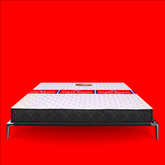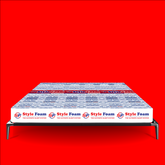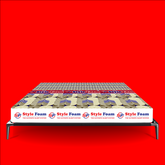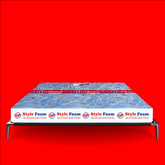Getting a good night’s sleep starts with one essential factor — your mattress. A high-quality mattress doesn't just offer a comfortable place to sleep, it supports your spine, reduces aches and pains, and improves overall health. In today’s busy world, more and more people are realizing the importance of investing in a good mattress, not just for sleep but for a better quality of life.
In this blog, we’ll cover everything you need to know about choosing the perfect mattress — from different types and materials to tips on how to maintain your mattress for long-term comfort.
Why Your Mattress Matters
We spend about one-third of our lives sleeping. That’s why the mattress you sleep on significantly impacts your posture, health, and how rested you feel each morning. A bad mattress can cause:
-
Back and neck pain
-
Poor sleep quality
-
Spinal misalignment
-
Allergies due to dust mites or mold
On the other hand, the right mattress can:
-
Relieve pressure points
-
Support spinal alignment
-
Minimize tossing and turning
-
Improve overall well-being
Different Types of Mattresses
There is no one-size-fits-all solution when it comes to mattresses. Understanding the types available can help you choose the best fit for your body and sleep style.
1. Memory Foam Mattress
Memory foam is known for its body-contouring abilities. It molds to the shape of your body, offering excellent support and pressure relief.
Best for: Side sleepers, people with joint or back pain.
Pros:
-
Reduces motion transfer
-
Relieves pressure points
-
Hypoallergenic
Cons:
-
Can retain heat
-
Slower to bounce back
2. Innerspring Mattress
Traditional and widely used, innerspring mattresses use coil systems for support.
Best for: Stomach or back sleepers, people who prefer a bouncy feel.
Pros:
-
Better airflow
-
More affordable
-
Durable
Cons:
-
Less contouring
-
Can be noisy
3. Hybrid Mattress
Combining foam and springs, hybrid mattresses offer the best of both worlds — comfort and support.
Best for: Combination sleepers, couples.
Pros:
-
Balanced feel
-
Great for motion isolation
-
Excellent support
Cons:
-
Heavier and more expensive
4. Latex Mattress
Made from natural or synthetic latex, these are eco-friendly and extremely durable.
Best for: Eco-conscious buyers, allergy sufferers.
Pros:
-
Naturally cooling
-
Long lifespan
-
Dust mite resistant
Cons:
-
Heavier than most types
-
Pricey
How to Choose the Right Mattress
The right mattress depends on your body type, sleeping position, and personal preferences.
Consider Your Sleeping Position
-
Back Sleepers: Need a medium-firm mattress that supports spine alignment.
-
Side Sleepers: Benefit from softer mattresses that cushion the shoulders and hips.
-
Stomach Sleepers: Require a firmer mattress to prevent back arching.
-
Combination Sleepers: Prefer a responsive mattress like latex or hybrid.
Body Weight
-
Lightweight (under 130 lbs): Softer mattresses offer better contouring.
-
Average weight (130–230 lbs): Medium to medium-firm mattresses provide balanced support.
-
Heavyweight (230+ lbs): Firmer mattresses prevent sinking and ensure durability.
Health Conditions
If you have chronic back pain, a memory foam or orthopedic mattress can help relieve pressure. People with allergies should look for hypoallergenic and antimicrobial materials like latex or certified foams.
Mattress Sizes and Dimensions
Choosing the right mattress size ensures maximum comfort and space.
| Size | Dimensions (inches) | Ideal For |
|---|---|---|
| Twin | 38” x 75” | Kids, solo sleepers with limited space |
| Twin XL | 38” x 80” | Taller teens or college students |
| Full | 54” x 75” | Single adults, guest rooms |
| Queen | 60” x 80” | Couples, master bedrooms |
| King | 76” x 80” | Couples who want extra space |
| Cal King | 72” x 84” | Tall sleepers, large rooms |
Mattress Lifespan and When to Replace
The average mattress lasts 7–10 years, but this depends on the material and usage. Here are signs it’s time to replace your mattress:
-
You wake up with stiffness or pain
-
Visible sagging or lumps
-
Increased allergy symptoms
-
Trouble falling or staying asleep
To extend mattress life:
-
Rotate your mattress every 3–6 months
-
Use a mattress protector
-
Keep it clean and dry
-
Avoid jumping or placing heavy items on it
Budgeting for a Mattress
Good sleep is an investment in your health. While you can find mattresses for as low as $150, a quality mattress typically costs between $500 to $1500 depending on size and material.
Spending a little more upfront for a durable, comfortable mattress often saves money in the long run and leads to better sleep quality.
Online vs. In-Store Mattress Shopping
Both options have pros and cons.
In-Store:
-
Try before you buy
-
Immediate delivery
-
Salesperson guidance
Online:
-
More variety
-
Better prices
-
Home trials (usually 90 to 365 nights)
-
Free returns
If buying online, make sure the brand offers a free trial period and a warranty of at least 10 years.
Final Thoughts: Make Sleep a Priority
Choosing the right mattress isn’t just about comfort — it’s about health, productivity, and quality of life. The right support can relieve pressure, align your spine, and help you wake up refreshed every day.
So whether you’re upgrading your sleep setup or buying your first mattress, take your time, do your research, and invest in what matters most — your sleep.












